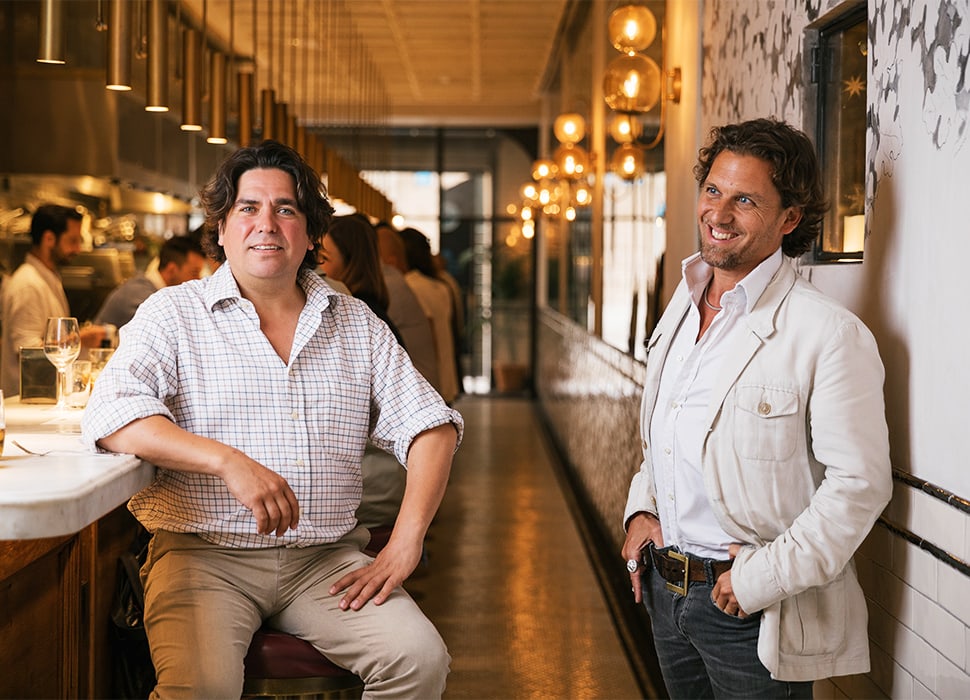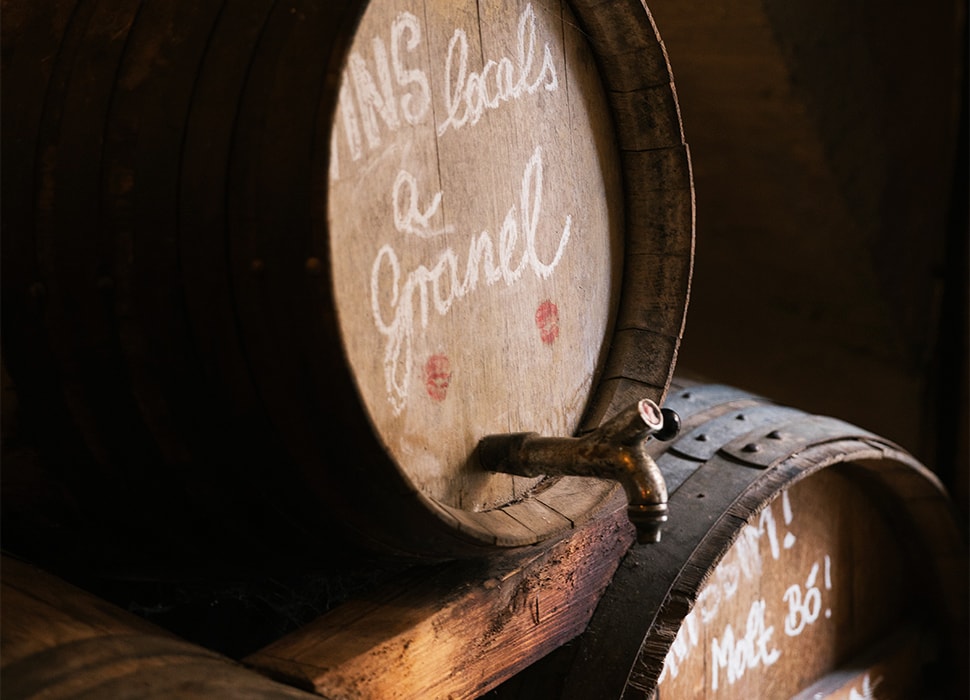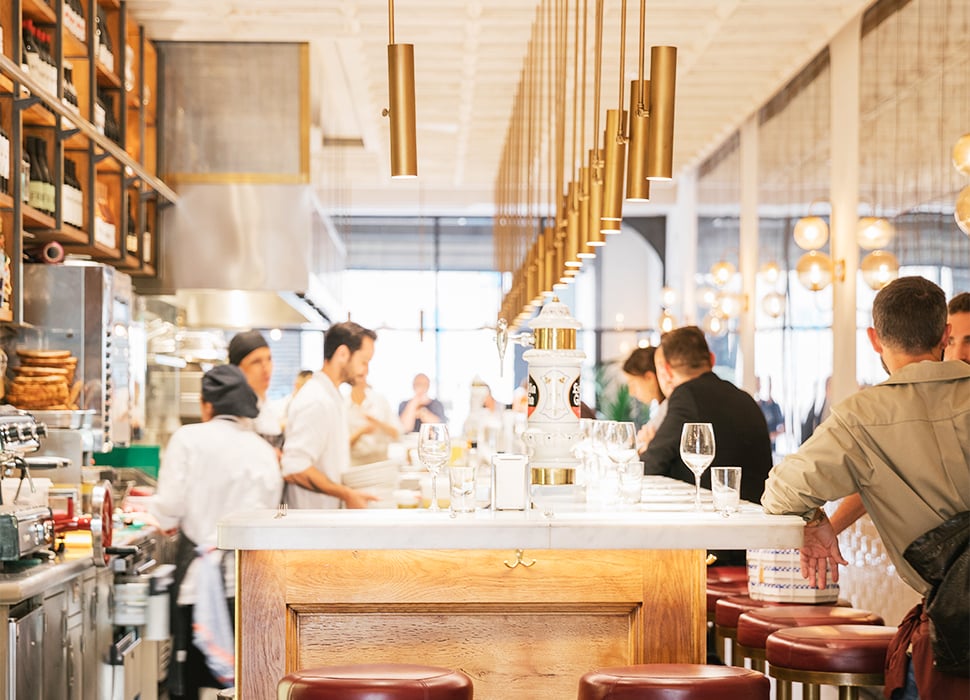It’s just before lunchtime and the staff of El Camino – a smart new restaurant in Palma de Mallorca – are getting ready to receive their first customers of the day. A team of mainly Spanish chefs and waiters fire up planchas, prepare octopuses and check the Estrella beer is cold. The thin, elegant room is dominated by a long bar topped in white marble and panelled in oak, with seats fixed along its length and cylindrical lights shining on each place setting. It is, in all respects, a pretty cool place.

For the proprietor, Eddie Hart, and his business partner Samuel Gough, El Camino represents a challenge, however. One that’s come at the end of a long journey. “El Camino means ‘the path’,” Eddie explains, surveying the handsome space. “On the way here it felt like everything had come together.”
The chefs bring out a selection of dishes for us to try. Everything is perfect. There’s a plate of plump, firm anchovies with a drizzle of high-grade olive oil. A fillet of red mullet on a bed of golden rice, practically glowing with umami. Four scallops sitting in their shells, a thick octopus tentacle, a lettuce quartered and charred, artichokes under a couple of fried eggs. Next, some croquettes, an acid test of any Spanish restaurant. These aren’t sad little Wotsit-orange logs, fried out of freezer bags and served at room temperature. They are impeccable: straight from the fryer, with crunchy hot shells giving way to oozing béchamel.

Still, none of the food answers the central question. Why on earth is Eddie Hart here, down a quiet backstreet near La Seu, the 13th-century cathedral, trying to sell tapas back to the Spanish? With his brothers, Sam and James, Eddie is one-third of the Hart Group, one of London’s most respected restaurant companies. They’re behind Barrafina – a family of four exquisite tapas places that have redefined Spanish cooking in the British capital. The Group boasts queues from lunchtime until closing, a Michelin star and a total of 11 venues. So, what’s he doing on a hot island in the middle of the Mediterranean?
The short answer is that Majorca provided the antidote to a London existence he couldn’t take any more. Years of living the high life had burned him out. In Palma’s higgledy-piggledy Gothic alleyways, mineral breeze and bright Balearic sunshine, he has found a kind of calm that had long eluded him back home. “The weight and pressure of the family business was too much,” he says, matter of factly. “I’m a kind of glorified waiter. I like to be in one restaurant, focusing on the details, correcting wonky bottles, monitoring the service, the rubbish collection, the uniforms. Through nobody’s fault, we had opened restaurant after restaurant without facing down what our end goal was.
Majorca _Tapas Tour_5.jpg

“I’ve got a penchant for the high life and when one’s unhappy that’s exacerbated,” he continues. “I was playing up to being the black sheep of the family, expected to be naughty. My brothers were at their wits’ end with me and I was at my wits’ end with my situation. At last I felt I couldn’t stand another minute in London.”
Five or six glasses of Majorcan wine to the good, we step out blinking into the afternoon, so Eddie and Samuel can show off some of their favourite haunts (and assess the competition). El Camino stands out as sophisticated in a city better known for its simple yet hearty tapas, but there is still plenty of remarkable food and drink to be had in the hands of an expert guide. Not far from El Camino is a vermuteria, La Rosa, where glasses of draught vermouth come served with stuffed olives, anchovies and jalapeño peppers, a full-flavoured bar snack if there ever was one. New hotels are opening, too, like Can Bordoy and the Palacio Can Marques, grand properties in the Old Town converted into luxurious city hotels. The government is a few years into a beautification project that it hopes will encourage the more aesthetically minded kind of tourist.

As we walk, Eddie explains that El Camino provided the chance to make good on a long-held dream with his friend Samuel, a singer-songwriter who had fallen in love with the Soho outpost of Barrafina after reading about it in easyJet Traveller on a flight from Malaga to Stansted a decade ago. “When I landed, I hopped straight in a taxi to Frith Street,” Samuel recalls. “I was blown away. It became my favourite restaurant. I ate there five times a week.” He and Eddie met one evening, and found out they had Majorca in common, as well as a love of jamón and padron peppers. Eddie’s grandparents had lived there and the family still had a holiday home outside Palma, where he and his brothers would spend the summers.
“My grandfather was a painter and a bit of a rogue,” says Eddie. “He had a beautiful sailing boat and would go round the islands with my mother and her sisters painting the rich and famous. Sometimes they’d have to leave in a hurry. Eventually my grandmother suggested it might be time to settle down.”
Once installed on Majorca, the Harts’ grandfather struck up a friendship with Samuel’s great-uncle, the poet Robert Graves, who lived there for many years. One of their favourite spots, Bar Bosch, is still going strong, just round the corner from El Camino, next to the Tortugas Fountain. It opened in 1936 and is much the same. “My grandfather and Robert Graves would come here every day, for a small coffee and a whisky,” Eddie says. “It hasn’t changed a bit. It’s still honest and brilliant and diverse.”

Majorca has hundreds of years of food history, but Eddie and Samuel felt they could bring a bit of big-city polish to the offering. “I thought there was an opportunity to do something different, but I was too busy in London and too scared to strike out on my own,” says Eddie. It wasn’t until the start of last year that he decided to take the plunge. They found the site in the spring and were open six months later, after a frenetic period of designing, hiring and battling with the local authorities. Samuel has chosen the wine list, which includes 10 from the island, 19 from the rest of Spain and two from France. His partner, Elsa, a designer, took the lead on the interior, which is inspired by bars in Cuba and Spain. We drop into one of their suppliers, a hip-as-you-like nearby coffee roaster called Mistral, which represents the new school of Majorcan food and drink.
Change is arriving slowly. Eddie explains that the tradition for wealthier locals is to eat at home and a meal at El Camino, where the average spend is around €40 per head, seems like the height of lavishness. “The main complaint is that we are expensive, which upsets me slightly,” he says. “If you’re sourcing the best milk-fed lamb on the island, you have to pay for it.” Another of their suppliers is nearby: Mallorcària, a wine shop run by their friend Xavi. At Bodega Santa Clara, Ute, a German expat, serves excellent natural wines for “ridiculously cheap” prices, according to Hart, to customers sitting on upturned plastic buckets.

Eddie points out that his change of venue has not meant a life of monk-like restraint quite yet. “Palma seems to me a healthier, happier place to hit it hard than back home. Samuel and I can have our Campari and soda at 5pm and all feels well with the world.” For Samuel, opening the restaurant has been a career change and a chance to use years of wine expertise to help promote Majorca’s small growers. For Eddie, you sense the restaurant has been a route back to himself, offering purpose and solace, and a way to escape the metropolitan distractions of success.
Later in the evening, we ponder a destination for a last couple of dishes and perhaps a glass of something. Eddie suggests a few places before the truth comes out. “Quite honestly, I think we should go back to El Camino,” he says. He grins with relief when I agree. We totter over to find a queue of expectant customers that has started to mill around the block. Inside, the restaurant is packed. Spanish, English, French and German voices rise above the clatter from the kitchen. Samuel pours the wine, Eddie walks the length of the bar, checking his guests are happy, checking everything is just so, doing what he does best: selling tapas.
El Camino, Carrer de Can Brondo, 4, 07001 Palma
elcaminopalma.es
Know your tapas: how to order like a pro

Trempó
A classic Majorcan salad, often served as a starter in the summer. It’s made up of tomato, white onion and green pepper, dressed in oil and lemon with a hint of pepper or cumin. It can also be served on a flatbread base, a bit like a pizza.
Frito Mallorquín
Literally meaning ‘Marjorcan fry’, this is a rich, hearty dish, with lamb – usually including offal, like liver or kidney – cut into pieces and fried with peeled potatoes, onions, fennel, artichoke, garlic, red pepper and peas.
Lechona
The classic Balearic feasting dish, a suckling pig seasoned and flavoured with garlic, olive oil and a splash of brandy, then roasted until tender.
Ensaïmada
A flat, rich breakfast pastry, traditionally made with reduced pork lard called saïm. Enjoy with coffee and orange juice, and perhaps pa amb oli, another classic Majorcan breakfast of bread with tomato, garlic and olive oil.
Book flights to Majorca Book holidays to Majorca